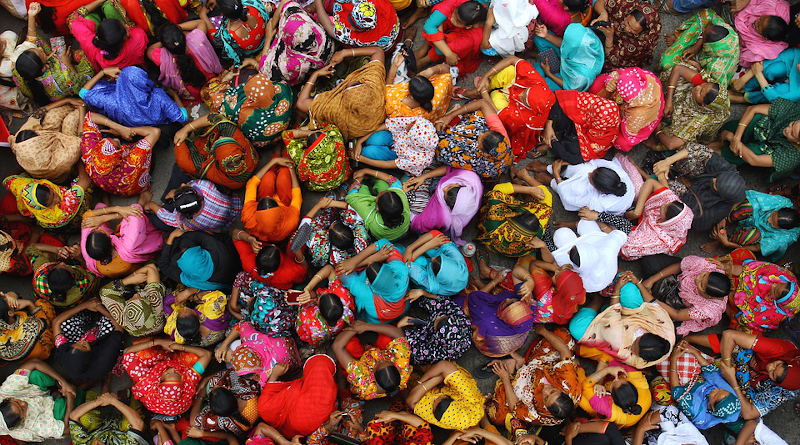Woman In Islam: The East-West Paradox – OpEd
- April 11, 2023
- Posted by: admin
- Category: Pakistan

Next Wednesday will be a particularly busy day for Islamabad. While Foreign Minister Bilawal Bhutto Zardari is presiding over a conference on ‘Women in Islam’ at the UN headquarters at New York and delivering the opening address on “Understanding the Rights and Identity of Women in the Islamic World,” the Aurat’ [Women] March will take place across Pakistan on the same date.
First held in 2018, the Aurat March is an annual socio-political event that strives for gender equality in the highly patriarchal Pakistani society and seeks-
- Ending violence against women.
- Parity in labour rights.
- Reproductive rights.
- Environmental justice.
- Anti-sexual assault laws.
- Wage equality.
- Fair political representation and opportunities.
- Education equality.
- Equality for the transgender community.
- Child marriage.
- Rights of religious minorities.
- Promoting an anti-war agenda.
- Ending police brutality and ending enforced disappearances.
Regarding the ‘Women in Islam’ seminar in New York, The Express Tribune mentions that “the stated objective of the conference, convened by Pakistan, is to bridge the perception-reality gap on the rights of women in Islam and celebrate the experiences and successes of iconic Muslim women.” This is a topic on which Bilawal should not have any problems in dealing with.
In fact, with his mother Benazir Bhutto Zardari having the unique distinction of becoming the first female prime minister in a Muslim majority country, there possibly couldn’t be a more suitable person than Bilawal to speak on this issue. However, the same can’t be said about his ability to “bridge the perception-reality gap on the rights of women in Islam.”
Bilawal will obviously highlight the fact that Islam provides Muslim women equal rights as their male counterparts. He will however simultaneously try to downplay ground reality regarding widespread repression of women in many Muslim majority countries through motivated edicts issued by the inordinately orthodox clergy. Ironically, for obvious reasons, Bilawal will not be able to showcase Pakistan as an epitome of gender equality as prescribed in the Holy Quran!
Though a peaceful rally, thanks to fundamentalists who call the shots in Pakistan, the Aurat March has never gone off smoothly and there’s no reason to believe that things would change this time. In fact, problems regarding the conduct of this rally have already started!
Last month, Lahore’s Aurat March organising committee had approached the district administration for a ‘no objection certificate’ to hold this event. Realising that the administration was averse to this function, the organisers downscaled the scope of this event to just a rally at Nasser Bagh followed by a token march around this park’s perimeter.
The organisers may have thought that being held within the confines of a park this event would not cause any public resentment or inconvenience the people. Hence, no one expected that permission to hold this event would still be denied. Unfortunately, this is exactly what’s happened and Lahore’s Deputy Commissioner [DC] has refused to give a go-ahead for this event.
The reasons assigned for disallowing the Aurat March event in Lahore are really astounding.
Lahore’s DC said that permission was denied due to “the current security scenario, threat alerts, and law and order situation, and in light of activities like controversial cards and banners for awareness of women’s rights and the strong reservation of the general public and religious organizations, especially JI’s [Jamaat-i-Islami] women’s and student wings, who had also announced a programme against the Aurat March.” [Emphasis added].
One wonders if during the course of his ‘perception-bridging’ talk in New York, would Bilawal care to explain why permission to hold the Aurat March in Lahore has been denied, and what exactly constitutes “controversial cards and banners for awareness of women’s rights.” In the past, some slogans have created controversies and one was- “mera jism meri marzi [My body, my choice]. While this slogan may have scandalised conservative Pakistanis, but in a country where women are often taken for granted and treated as mere objects, isn’t it an appropriate way to convey that no sexual advances should be made against a woman’s consent?
Readers may recall that in 2020, when eight citizens had petitioned Islamabad High Court [IHC] arguing that slogans like ‘my body my choice’ were offensive, violative of Islamic injunctions and against established norms, IHC Chief Justice Athar Minallah had queried as to how did this slogan contradict Islamic values, noting that “these slogans are asking for the rights given to them [women] in Islam.” He also hit out at the fundamentalists by saying, “How can we interpret the meaning of these slogans ourselves when the organisers [during a press conference] have clarified that they were asking for the rights granted to them in Islam”? [Emphasis added].
So, we are staring at a monumental paradox. While Pakistan’s Foreign Minister in New York will wax eloquent to “bridge the perception-reality gap on the rights of women in Islam” on March 8, back home, a district-level government official has denied women their constitutional rights by shamefully surrendering to hardliners who espouse radical religious ideology that relegates women of the Islamic Republic of Pakistan to second class citizens. And the ultimate irony is that the order denying permission to hold Aurat March rally calling for women empowerment has come from Lahore’s DC, Rafia Haider, who herself is a female.
